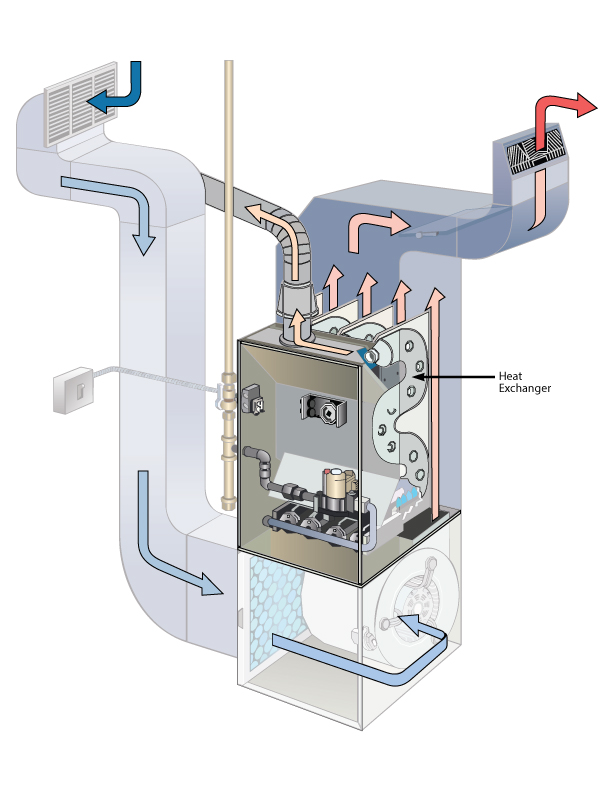If you’re in need of a new furnace, you may be debating whether to get a more expensive condensing furnace or going with a standard, non-condensing unit.
Here’s our general recommendation for New Jersey residents: If you can afford the higher upfront cost, we recommend going with a condensing furnace because it’s more energy-efficient, which means you’ll save money over time compared to a non-condensing unit.
In this blog, we’ll explain:
- The difference between a condensing and non-condensing furnace
- Questions you should consider with a professional before making a decision
__________________________________________________________________
The difference between a condensing and non-condensing furnace
To explain how a condensing furnace is more energy-efficient, let’s start by looking at the difference between condensing and non-condensing systems.
The main difference between the two types of furnaces is the number of heat exchangers they have. (The heat exchanger, pictured below, is the part that actually heats your home’s cold air.)
The heat exchanger is located in the heart of the furnace
A standard, non-condensing furnace has one heat exchanger, which uses natural gas to create heat via combustion. Some of the heat created by combustion is vented outside of your home, along with exhaust gases and water vapor.
Standard furnaces are about 80% efficient. This means that 80% of the fuel used during combustion goes directly towards heating your home. The other 20% is “wasted” energy—it’s the heat that’s vented outside of your home with the exhaust gases and water vapor.
Condensing furnaces, on the other hand, have two heat exchangers. The purpose of the second heat exchanger is to extract more heat from the combustion gases and water vapor. This means with the same amount of fuel, a condensing furnace can provide more heat than a non-condensing furnace.
As a result, condensing furnaces can be anywhere from 90% to 98% efficient. If you opt for a condensing furnace, you’ll ultimately spend less money heating your home over time compared to a non-condensing furnace.
Now that you know the difference between the two types of furnaces, let’s look at some questions you should consider before making a decision about what kind of furnace to get.
Questions you should consider with a professional before you make a decision
In the beginning, we said we generally recommend New Jersey homeowners choose a condensing furnace. Since we rely on our furnaces several months during the year, investing in a condensing furnace can cut down monthly utility costs, saving you money in the long run.
However, our recommendation could change depending on situations specific to your home. In order to know whether a condensing furnace is right for you, you’ll need to consult with a professional to consider questions like:
- What’s your budget? Installing a condensing furnace is more expensive because of the cost of the extra heat exchanger and the cost to install a drainage system for the condensate produced by the furnace. If you’re on a tight budget, we’d recommend choosing a non-condensing unit.
- What is the condition of your ductwork? If your ducts are in bad condition (meaning they have leaks), you won’t see the energy savings of a condensing furnace. In that case, we would recommend having your ducts sealed before you invest in a high-efficiency condensing unit.
- How long do you plan to stay in your home? If you don’t plan on staying in your home for the next 10 to 15 years (the average lifespan of a furnace), you may not want to invest in a condensing unit.
The HVAC professional you consult with to install your furnace can help you determine if a condensing furnace is a good investment for your particular situation.
Want a furnace recommendation from a NJ pro?
Our heating specialists will give you honest answers to your questions and upfront pricing on the cost to install a new furnace in your home. We won’t upsell you on equipment you don’t actually need—our recommendations are based on your heating needs and budget.

